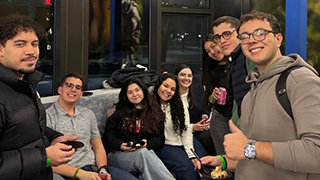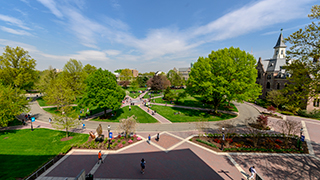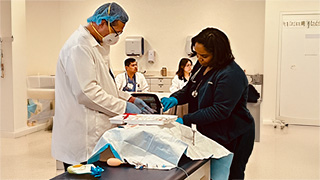Physics Professor Mehmet Sahiner and Edwin Baiden Awarded STEM Undergraduate Research Award
Wednesday, May 8, 2024
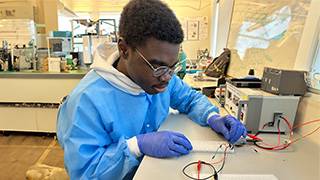
Edwin Baiden pictured in the physics lab.
At the start of this year, Physics Professor Mehmet Alper Sahiner, Ph.D., and his student Edwin Baiden were awarded the STEM Undergraduate Research Award for their study "Enhancing Energy Storage with Flexible Laser-Induced Graphene Supercapacitors." Through their study, they are trying to convert graphene into a supercapacitor, and eventually create an alternative to traditional batteries.
To synthesize the graphene, Sahiner and Edwin used visible light from a laser and layers of Kapton tape as a film. As the laser is shone onto the Kapton tape, it converts the tape’s polyimide into a porous graphene structure which is primarily composed of a single layer of carbon atoms arranged in a hexagonal lattice nanostructure. A capacitor is then built using the produced graphene pattern as well as pieces of copper tape. Sahiner and Edwin use the graphene as electrodes and pair it with copper tape to build a capacitor. However, the goal of their research is to do more than use the graphene as an electrode. For the capacitor that they have built to not only store charge but allow charge to move through the capacitor, they need an electrolyte. So far, they have been working with a hydrogel, which is a jello-like consistency made from polymer plastic. This use of hydrogel and sulfuric acid has allowed them to create a renewable electrolyte solution. Once Sahiner and Edwin integrate the hydrogel electrolyte with the graphene capacitor, this creates a supercapacitor that can store charge and release it when needed.
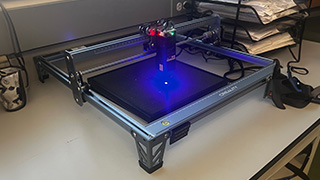
Edwin's Capacitor.
Sahiner and Edwin’s work on supercapacitors could potentially create an alternative to traditional batteries by creating a longer charge-discharge cycle than batteries. Along with having a longer charge cycle than batteries, they are also looking to minimize the amount of space that traditional batteries need. Since they are building their capacitors in a 2-D form, they can minimize the distance between electrodes and increase the surface area. This development could save the space that batteries normally could take up, and lead to the advancements of micro technologies. Their research in supercapacitors hopes to eventually find the medium between having a good power density and having a good energy density.
Prior to receiving the STEM Undergraduate research award, Sahiner and Edwin had already received a grant from NASA, but they soon found out that more funding was needed to reach their desired results. Edwin describes receiving the research award as "a blessing that came at the perfect time." Receiving the STEM Undergraduate Research Award has allowed them to conduct better quality research in a much more thorough manner, to achieve their overall goal.
Though Sahiner is accomplished in his field, being a Fulbright Distinguished scholar himself, he has truly appreciated the opportunity to mentor Edwin throughout this experience. As Sahiner has observed him and his work through the years, he says "Watching Edwin progress as a scientist and lead the newer students in the lab has been rewarding." Being that Edwin is a part of the 3+2 Physics and Engineering program, Sahiner is confident that this study will prepare him for graduate school. Likewise, Edwin shared that Sahiner has been very accessible throughout the entire study and continues to mentor Edwin while giving him the independence to conduct research.
Seton Hall has a robust Department of Physics with a wide range of faculty researching in cold plasma, lasers, energy, biophysics, computational physics, and other related areas. The Department offers both bachelor’s and master’s degrees, and Seton Hall is excited to announce a new 3+2 B.S./ M.S. Program that will enable students to earn a B.S. in Physics and an M.S. in Applied Physics and Engineering in just five years. Generous scholarships are available for the M.S. program: apply now for Fall 2024! Students interested in STEM research should contact Associate Dean Mitra Feizabadi and students interested in STEM graduate programs should contact Associate Dean Michael Dooney.
Categories: Science and Technology


